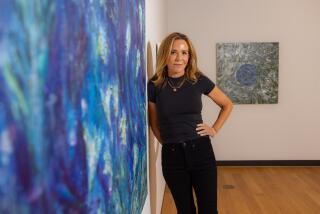
- Share via
Joan Chen got her first taste of fame as the teen star of “Little Flower” (or “Xiao hua”), a melodramatic war epic released in her native China eight years before her big international breakout in Bernardo Bertolucci’s “The Last Emperor,” a 1987 Columbia Pictures release that won nine Oscars, including best picture. Chinese fans still come up to her to gush about the earlier film. “I was being mobbed on the street, and every family had a calendar with my face on it,” she says of the film’s reception in China when she was just 18.
But for many years, she and her parents saw acting as a temporary job, something to do until she landed on her real vocation.
Only years after moving to the U.S. to find a career did Chen realize she already had one.
That career has been treating her well lately, thanks to a series of roles juicier than most she has encountered as a performer. In “Didi,” Sean Wang’s biting coming-of-age drama about an angst-ridden Bay Area adolescent (Izaac Wang) finding his way, she plays Chungsing, a mother trying to balance parenting duties with her dreams of painting. She played an AI tech titan in the 2023 FX series “A Murder at the End of the World.” Soon she’ll star in a reimagining of the 1993 Ang Lee rom-com “The Wedding Banquet,” and, alongside Michelle Pfeiffer, in Michael Showalter’s Christmas comedy “Oh. What. Fun.”

“I don’t think I’ve had as busy a year in North America for a very, very long time,” she says in a recent interview, poised and quietly glamorous in an elegant gray turtleneck sweater.
Chen was particularly drawn to “Didi,” and the opportunity to play a well-rounded variation of a character she knows well. “I don’t think I’ve seen many Asian mothers like this on screen, and yet I have known them in life,” says Chen, whose two daughters are 22 and 26. “They are not the typical tiger moms or strict matriarchs, like in ‘Crazy Rich Asians’ or ‘The Joy Luck Club.’ This mother is playful, artistic, gentle, confused, unsure and loving. Under-appreciated. Those are the authentic mothers that I know.”
She knew she had something special when she showed the script to her daughters. “They are usually very critical,” she says. “But they both loved it.” The jury of two was especially impressed with the authenticity of the teen dialogue: “I wasn’t so sure about the conversation because I didn’t grow up here. And they could relate to the teen shenanigans as well.”
Chen moved from China to California when she was 20. Studying communications at Cal State Northridge, she started picking up small parts in series such as “Miami Vice” and “Knight Rider.” But even after “The Last Emperor,” she was trying to figure out what she was really supposed to be doing with her life. “I was taking classes in astronomy and anthropology,” she says.
A career in religion also seemed like a possibility. She would go make a movie, wait a few months for a call to shoot the next one, grow disillusioned with her acting career and then, inevitably, get that next call. Bouncing from one field of study to another, she was almost 30 when she graduated.
Finally, she realized that maybe she should just be an actor.


“For so long, I wanted to see if I could have a real profession other than acting,” she says. “But looking back, I know this was my destiny. I think it’s important to know your destiny, but we usually don’t know until much later in life. We struggle, we fight against it. And we experience so much anxiety trying to find ourselves when our true selves are staring us in the face all that time.”
For much of Chen’s early career in Hollywood she was cast in generic Asian roles — think “On Deadly Ground” with Steven Seagal, or “Judge Dredd” with Sylvester Stallone. But more rewarding work has been there as well. She worked, for instance, with David Lynch on “Twin Peaks,” and Ang Lee on “Lust, Caution.” She has always managed to carve out a place.

Today, she sees better opportunities for Asian actors seeking more meaningful work. Between such series as “Shōgun” and the upcoming “Interior Chinatown” (a meta look at Asian stereotypes in entertainment), and movies like “Didi” and “Everything Everywhere All at Once,” she believes the tide is slowly shifting.
“There is more visibility in social media, and in films and television,” she says. “There’s a little more representation, a little more exposure. Meaningful parts for Asians in Hollywood were basically nonexistent when I first moved here. Even after ‘The Last Emperor’ won nine Oscars, I didn’t get many calls for work. People didn’t know how to use you. It’s much, much better now.
“I’m so happy that I didn’t quit and that I’m still here.”
More to Read
From the Oscars to the Emmys.
Get the Envelope newsletter for exclusive awards season coverage, behind-the-scenes stories from the Envelope podcast and columnist Glenn Whipp’s must-read analysis.
You may occasionally receive promotional content from the Los Angeles Times.











